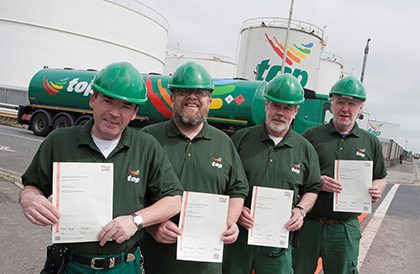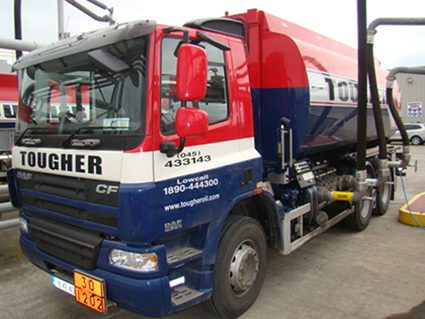Tackling low margins
Outlining how consumer spending has changed, Martin said heating oil order sizes had reduced to 500 litres and even 300 litres, down from an average 1000 litres a few years ago. “Drivers are busy but orders are small,” said Martin, whilst highlighting that Top Oil can no longer charge a premium for a small drop, as it would isolate too many customers. As a result, he underlined how difficult it is to get a margin on this side of the business.
To survive in the current climate, it has been important for Top Oil to have other strings to its bow. The company has concentrated on other offerings including its retail outlets and fuel cards, which are going strong.
To tackle low margins on small orders, Ardee-based Malone Oil Products, which delivers in Meath and the border county regions of Louth and Monaghan, sourced a mini-tanker in early 2011. For smaller deliveries, director Padraig Malone reports this tanker is cheaper to operate than the two 20,000 litre tankers also in the fleet.
Calls for lower taxes, COD and drums
Due to Malone Oil’s proximity to the border competition from Northern Ireland-based distributors, who can sell the same product at a much cheaper rate due to lower tax rates, is another ongoing problem. Although Padraig appreciates that the Irish government cannot determine the price of fuel, he says they could lower the level of tax on it; but he is not hopeful that this will happen anytime soon!
Hugo McManus, operations manager at Kildare-based Tougher Oil is critical of the high level of tax on oil products in Ireland, which he highlights accounts for 60% of the cost that customers see daily.
“There’s pressure from every angle,” he says with credit terms reduced from oil suppliers, which in turn need to be passed on to the consumer. “For the most part we need to demand cash on delivery which isn’t always what the customer wants to hear,” said Hugo. “But it’s too risky to accept anything less.”
As order sizes have dropped, Tougher noticed a niche for the sale of 20 litre drums of home heating oil and now sees a growing demand for them at its forecourts.
“Loyalty doesn’t come into it anymore,” he says with very little guaranteed return custom and distributors now held to ransom by the price conscious consumer.
Cutting out the cowboys with ROM1
Gary Power, director of Dublin’s Liffey Oil says the introduction of new daily pricing has made the market ultra-competitive with customers willing to change supplier for as little as one euro on a bulk purchase.
Gary hopes that the new Monthly Return of Oil Movements e-filing requirement introduced on 1st January 2013 will cut-out a lot of cowboys who are dealing in washed diesel. Washed diesel is proving a big hit with cash strapped customers, but it is taking substantial business away from genuine businesses like his, he says.
At the moment, it is thought that somewhere between 12-20% of diesel on the market has been tampered with, with its distributors then able to sell their product at sometimes 9% below the average price.
It is apparent that competing on price is paramount for oil distributors with most consumers now ordering smaller amounts of fuel, less often. What is also important is that the quality of the product and the level of service remain high and are not lost in the battle to offer a competitive product.
————————————————————————
Keeping the home fires burning
Whilst speaking to distributors this month, Aine Faherty reported no evidence of investment in renewable technology (biomass, air/ground source heat pumps or the installation of solar PV/thermal equipment). “Basically, distributors said people weren’t investing money in any green equipment …..even though it might save them money in the long-run.”
“Irish consumers are reverting back to using open fires more,” said Aine. “They’re also investing money in having solid fuel burners installed in their homes and connecting them up to the central heating system, thus taking away the need to rely as much on oil or gas.
“Whilst there are big advertising campaigns being run by solid fuel burning businesses, there are not many businesses advertising in the renewable energy sector as yet. Undoubtedly, this will change in future.”
Fuel Oil News welcomes your opinion – jane@fueloilnews.co.uk.

